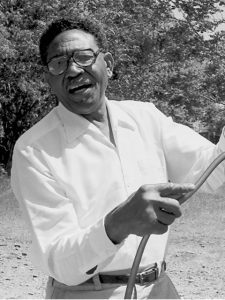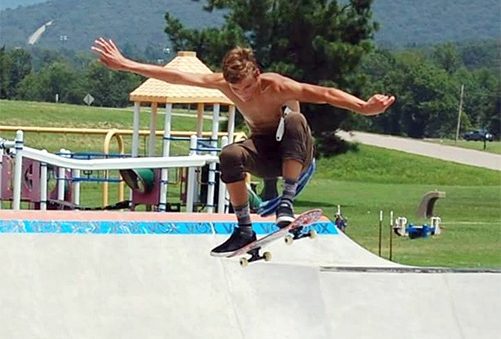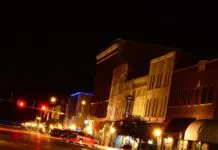Tucked between the Ouachita National Forest and the Arkansas River lies an old town with some unusually progressive elements.
Poteau pitches itself as “Above the Ordinary,” and two examples – one historically significant; one culturally recent – bear that out.
In 1955, a year after the U.S. Supreme Court’s landmark Brown v. Board decision, Poteau became the first Oklahoma municipality to integrate its schools. (Oklahoma City and Tulsa didn’t desegregate until 1972.)
A driving force to end Poteau’s educational segregation was veterinarian and civil-rights activist John Montgomery. The school board voted heavily in his favor, but townspeople “rebelled against it,” he told The Oklahoman in 2004, a decade before his death.
Mildred Randolph – Montgomery’s daughter, herself a veterinarian, and born and raised in Poteau – says she “had mixed feelings about [the town] when I was growing up, but now I have better memories.”
Randolph, director of laboratory animal medicine at the University of Arkansas for Medical Sciences, adds: “Geographically, it’s a beautiful place – mountainous, green. I’m proud of the progress they’ve made.”
Randolph visited twice recently – once to present the NAACP scholarship named for her father (he founded the local chapter), the other for an exhibit featuring him at the LeFlore County Museum.

“I also spoke with a history class at the high school, and that was the first time I had set foot in that building in 40-50 years,” she says.
Randolph, dedicated to diversity, equality and social justice, says it took time to fully appreciate the risks that her father and mother, Doris Montgomery, took as African-Americans from Texas making a life in Poteau.
“What they accomplished was so selfless,” she says. “But my brother and I at the dinner table would often ask, ‘Why in the heck did you come here?’ My dad’s answer was: ‘Look. I was trying to provide for my family. I wasn’t interested in demographics. I wanted to know how many cows they had.’”
Montgomery, LeFlore County’s first licensed vet, filled a void where many animals died from preventable diseases.
“He was an amazing diagnostician,” Randolph says.
Today, the town keeps surprising people. For instance, the eighth annual Slam Skate, July 27 at the Poteau skate park, draws hundreds of competitors and professionals from across the country.
Lisa Fabian, founder of the Nashoba Youth Foundation, pushed for the skate park’s construction in 2010-11 because of her desire to help the underdog. She was a longtime bilingual teacher and migrant director in nearby Heavener before retiring in 2016.
“Kids are always hanging out at the skate park,” she says. “One young lady told me it literally saved her life. She was suicidal. But the other skaters accepted her as she was. They accept everyone; they don’t shun anyone.”
FUN FACTS
Population
8,666
Tallest hill?
Cavanal – with a rise of 1,999 feet and an elevation of 2,385 feet – is a foot under the customary designation for a mountain. Therefore, Cavanal “is the tallest hill in the world,” the Poteau Chamber of Commerce says. However, the U.S. Geological Survey lists several hills above 2,000 feet and even calls the peak Cavanal Mountain. Regardless, the name derives from the French word for cave. On a clear day atop it, one can see Mt. Magazine in Arkansas – 80 miles east. Robert S. Kerr – Oklahoma oilman, governor and U.S. senator – had a summer residence on Cavanal.
Post time
In the late 1700s, French explorers established a post near Cavanal along what they called Riviere Poteau (the Post River). The village grew and was named after the Poteau, the only river in Oklahoma to flow north.
First free school
According to the City of Poteau, townfolk in 1898 taxed themselves $6,000 to build the first free public school in Indian Territory.
Q&A
Following are additional questions and answers for and from Lisa Fabian, founder of the Nashoba Youth Foundation, and Poteau native and veterinarian Mildred Randolph.
Oklahoma Magazine: Why was the skate park in Poteau built and why did you push for it?
Lisa Fabian: We were looking for something different for at-risk kids. We didn’t have a skate park in the area, but I knew from being a teacher that kids really liked it.
OM: Why do professional skateboarders from across the country come each July to the Slam Skate?
LF: Once you’re in their circle, they jump at the chance to help you. People fly themselves in just to volunteer and help these kids. They bring all sorts of products to give away. It’s like a huge family – people like George Orton, Bill Danforth, James Murphy, Peter Whitley and Patty McGee, all big names in skateboarding. And the kids get super-excited. They can’t believe they’re talking with their heroes. Every one of these professionals has a heart for kids.
OM: Why do you describe the skateboarding community as family?
LF: While other people may see them as different, they have instant acceptance at the skate park. The kids at the skate park don’t see themselves as different. And the numbers keep going up each year.
OM: What was it like growing up in Poteau, especially when your father led the movement to desegregate the school system?
Mildred Randolph: I had some very good friends, a handful of close friends. Overall it was challenging because there was such a small, small number of African-Americans there, so it was culturally isolating to me. I was the only African-American female in my graduating class. I made the best of it.
OM: How do you remember your parents, John and Doris Montgomery?
MR: My dad gets a lot of credit, but my mom was the person moving the ship quietly. I look at their impact and they accomplished so much more in their lives than I’ll ever do. They were the right people in the right place at the right time. They seized the opportunity and they risked a lot of personal gain. They made so many sacrifices. My parents didn’t go to many people’s houses for dinner. They have good friends in Fort Smith, but their business and civil-rights work was in Poteau. Later, my dad did have a social perspective that my mom didn’t have because he was hunter and went out hunting with a group of men. My mom didn’t really have that outlet. My mother was an amazing person in her own right. She was the first female and African-American on the pardon and parole board and was appointed by Gov. David Boren. She was a social-justice warrior.
OM: How do you remember the desegregation movement in Poteau?
MR: I think the people of Poteau are proud of their claim to fame being one of the first schools to desegregate. We’re talking about a small amount of students then. There may have been 200-300 African-Americans in town. There were about two or three students per class. It set a precedent. My dad saw the inequity between the school systems. Past the eighth grade, black students had to ride a bus to Spiro when there was the white high school two blocks away. Plus, the resources and teachers were not equal. At the black school, Dunbar, one teacher was teaching two or three grades at a time. It didn’t make any sense. No parent wanted a child to be to be in that situation.
OM: What other details about the petition to end segregation do you remember?
MR: Alpheus Varner filed the lawsuit as an attorney there – taking that kind of stand against a lot of his friends. I remember my dad saying about Alpheus, “I just love suing my friends. Let’s do this.” They had right on their side. He and his wife remained some of my parents’ closest friends there throughout their lives.
OM: Your family seemed like it was always on the go when you were growing up.
MR: Between the civil-rights work and the vet business, my parents were always doing something. I cut my teeth on vet medicine with my dad by working like a Trojan at his clinic, then we’d go to some NAACP function. We went to the march on Washington and my parents heard Martin Luther King Jr.’s “I Have a Dream” speech. My brother and I drove up there with them.
OM: Please talk about your brother.
MR: John II, as he’s called, always worked at the vet clinic from the time he was 6 or 7. But he had a different taste in his mouth and that’s why he went into sports and became a football coach. We’re very close. He embodies a lot of our parents’ beliefs in civil rights and the church. He lives in Houston and is retired from coaching at Texas Southern University. He has a sports-talk radio program and a podcast … and a lot of followers are from Poteau.

























